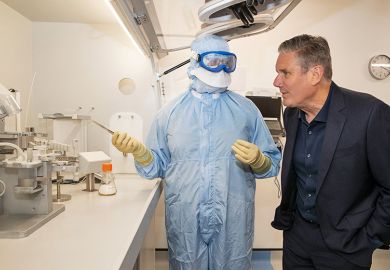Prince Charles recently warned that genetically modified crops are "guaranteed to cause the biggest disaster environmentally of all time". No one has the foresight necessary to make such a bold assertion.
His comments had particular resonance for me and my colleagues at Leeds because our small, legally authorised trial to grow GM potato plants in a field in Yorkshire was destroyed by vandals. We don't know who did it and can only make assumptions about why they acted. Some 400 plants were destroyed and the trial had to be abandoned.
We had no financial support from business and our research was publicly funded after a competitive review of the scientific case by a national research council. Moreover, approval was granted only after it was shown that the environment would not be harmed.
My colleagues and I were determining if we could control a major pest of potatoes safely without a pesticide. The pest was the pale cyst nematode (Globodera pallida); one of many microscopic roundworms to cause extensive damage around the world by feeding on the roots of crops.
Our research could be of benefit to agriculture not only in the UK, but elsewhere. We donate our expertise in nematode resistance to Africa and collaborate with the public science base there. We work with cooking bananas and plantains. They are cultivated extensively by subsistence farmers in Africa, but the nematode causes acute damage to this crop.
The food supply of between 30 million and 50 million Africans is affected annually by nematodes.
Our research could have provided ways to help remedy this situation, but, as it is, we are left rueing a missed opportunity.
This is a bigger issue than being either "for" or "against" GM crops. One leading organic farmer who disagrees with GM wrote to me after our trial was trashed to say its destruction "was an insult to science and an affront to democracy".
A society that is not able to ensure the freedom of academics to carry out publicly funded and peer-reviewed, legal research is facing a problem.
To quote Galileo: "All truths are easy to understand once they are discovered; the point is to discover them."
If any good can come out of the wrecking of our field trial, it is this - the views of those who oppose GM crops will come under greater scrutiny. Everyone's opinions are valid, but it is vital that they are based on accurate information.
Ensuring that scientific fact comes before speculative comment is not easy. I have put considerable effort into publishing data responding to the concerns of anti-GM protesters. Unfortunately, some activists disregard the truth to further their objectives.
An extreme example was in Bolivia, where indigenous people were told that eating GM potatoes would cause the plants to grow out of their heads and cause both pregnancy and abortion.
This happens in the UK as well; the anti-GM lobby claimed that potato trials in the UK were a risk to honey produced by bees. The bees that visit potatoes are bumblebees, and they don't make honey. Potato flowers offer no nectar for pollinators and hive bees cannot gather their pollen.
Environmentalists also argue that GM crops do not provide enhanced yields, but this is disingenuous.
Cotton plants have been modified to resist the attentions of some damaging insects, in order to defend yields and to lower the cost of insecticide use by reducing frequency of application. Other benefits are a reduction in health-related incidents from use of pesticides among small farmers and yield increases when crop protection was previously inadequate.
The general public is misled when the Green Revolution, the transformation of agriculture after the Second World War and based on conventional plant breeding, is presented as involving GM crops.
The Green Revolution improved food security for many millions in Asia who are dependent on wheat and rice for survival.
Publicly funded scientists around the world are working towards improving food security and are doing so without the assistance of biotechnology companies.
GM crops are one way of improving global food security, but should not be viewed as a panacea.
Possibly there is enough food in the world and certainly the food we have should be better distributed. But my concern is that many will starve before that global Utopia is achieved.
I wonder whether Prince Charles thought of all this before making his comments. I do not doubt his good intentions but I wish he appreciated the different views of equally well-intentioned scientists.
Register to continue
Why register?
- Registration is free and only takes a moment
- Once registered, you can read 3 articles a month
- Sign up for our newsletter
Subscribe
Or subscribe for unlimited access to:
- Unlimited access to news, views, insights & reviews
- Digital editions
- Digital access to THE’s university and college rankings analysis
Already registered or a current subscriber? Login



